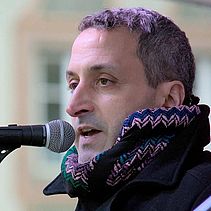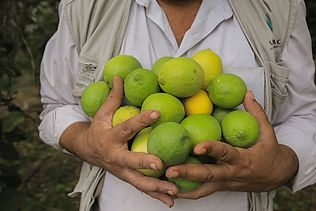It is not a unique feature of Israeli governments to avoid discussions with their political opponents by accusing them of terrorism. But this strategy has been methodically used by the Israelis for decades. This does not mean that no crimes have been committed by Palestinians against Israeli and Jewish civilians; of course there have. In the current context of the ban on human rights organisations, however, this shows above all that the intention is to prevent political organisation of the subjugated population – regardless of their willingness to use violence. This is evidenced by the military decree banning assemblies, which is still in force today, or the deportations of Palestinian lawyers, mayors and other persons who were considered important for political organisation in the wake of the 1967 war and in contravention of international law. This is also in line with state violence on a daily basis or – as in the case of the settlers – sanctioned violence against Palestinians in the course of land-grabbing, which makes it clear that resistance or even counter-violence will be met with even more massive violence.
The war in Israel, Israel at war
Since its foundation, Israel has never lifted the state of emergency – and the special powers this provides a (Jewish) state against its (Arab) subjects. A large number of the regulations issued upon the founding of the state in 1948 were unceremoniously taken over from the British Mandate administration in order to be in a position to move against the Palestinians. The British had issued so-called "Defence Emergency Regulations" in 1945 to take action against Zionist militias and the Palestinian national movement. The term terror was used even back then. Israel took advantage of this and incorporated the Emergency Regulations into its own legal system. Until the end of 1966, these were manifested, among other things, in martial law applying to Israel's Arab population. Arbitrary administrative detention, which is still practised liberally today, is another vestige from the colonial era, an anachronism of the law that the Israeli state uses almost exclusively against Palestinians. Without due process of law, people can theoretically be detained for any length of time by the military executive power, without any judicial supervision or consent. These emergency decrees are still in force today in the same or similar form in the entire territory between the Jordan River and the Mediterranean Sea.
With the outbreak of the second Intifada, a new "war on terror" was also waged in Israel and occupied Palestinian territory. However, this was already underway about a year before the 11 September 2001 attacks. The collapsing twin towers of the World Trade Center were fashioned into a symbol of an attack on "our freedom", with Israel once again posing as the bridgehead of "Western civilisation" in the struggle against "barbarism". This is exactly how Benjamin Netanyahu was introduced to the US Congress on 20 September 2001, as a former Israeli Prime Minister who had "led the fight (against international terrorism – note of the author) on behalf of his nation and alongside the rest of the civilised world".
After 9/11 and with the increase in Islamist terrorist attacks all over the world, Europe was finally forced to understand, from Israel's point of view, what this small country was constantly up against. Netanyahu presented Israel as the frontline state of the West in a clash of civilisations: "Each of us understands today that we are all targets and our cities are vulnerable, that our values are loathed and despised with an unprecedented fanaticism that seeks to destroy our societies and way of life." He placed the political confrontation of the Zionist national movement or the Israeli state with Palestinians in the wake of the September 11 attacks in the context of the need to fight global terrorism. Arafat, al-Qaida, Syria, Iran and Afghanistan were all seen by him as spawns of one and the same terrorist network that wanted to "install an extreme form of Islam as the dominant world power". Even more so than in the aftermath of 9/11, Europe finally had to see things from Netanyahu's point of view following the attacks in Madrid in 2004 and London in 2005. Even years later, there was hardly an Islamist attack that he did not exploit to draw parallels to the Israeli experience. After the attacks in Paris in 2015, he stated: "We are not to blame for the terrorism that is directed against us(...). It is not the [...] settlements or any other factor that keeps the conflict alive, but the will to destroy us and the murderous aggression against us."
Blame yourself
In this Manichean worldview, it is always and exclusively the others who are to blame. The "civilised world" only commits excessive violent crimes because the "irrational hatred" and boundless "barbarism" of the others leave it no other choice. Atrocities against those others are always only a form of self-defence.
Prime Ministers Netanyahu and Barak placed the confrontation with the Palestinians in the same context as the attacks by al-Qaida. This was the spin adopted by many governments at the time: despite the brutal transgressions that apparently even "civilised" countries expected of themselves in the course of the war, there would be, Barak said, "no moral equivalence between terrorists and those who respond to them". This laid down the guardrails, including for other contexts and regions. This attitude became the dominant logic underlying global warfare: by invoking the spectre of "terrorists", one's own violence was justified while at the same time delegitimising the violence committed by the enemy and thus denying it any politically negotiable motive. The "bloodshed of others", however politically motivated, was never allowed to be more than a barbaric spectacle. Our dead: Victims of terrorism, individuals with faces, histories and bereaved families. Their dead: abstract numbers, collateral damage, possibly "terrorists" themselves.
Whose terror?
In his speech delivered in Washington in 2001, Netanyahu declared that terrorism is not defined by the identity of the perpetrators, but by the nature of the act. However, in the discussion about terrorism, the focus is generally not on the deeds, but precisely on the identities of the perpetrators: when state actors murder civilians, no reference is made to terrorism, but this is almost always the case when a non-state actor does the same. The attitude of states not to recognise "terrorism" as a form of "political violence" follows a clear logic: the state is defending its monopoly over the use of force. In its "Council Framework Decision of 13 June 2002 on combating terrorism" the Council of the European Union accordingly referenced the following consensus: "The Council of Europe Convention of 27 January 1977 on the Suppression of Terrorism provides that terrorist offences cannot be regarded as political offences or as offences connected with a political offence or as offences inspired by political motives".
However, there is a tension here: after all, the foe may indeed very well be pursuing political goals. The fact that states also understand this is shown by a statement from the German Federal Government's "Second Periodic Security Report" of 2006: "In general, terrorism is not an expression of a specific culture, it is first and foremost an extreme political means of struggle. Terrorism is a strategy of struggle to challenge state power or the occupying power and thereby provoke waves of solidarity in the population groups whose vanguard the actors see themselves as. The immediate goal is not victory, but the spread of terror and fear, which can then (...) admittedly lead to a retreat by the enemy, as in 1983 in Beirut, 1989 in Afghanistan and 1993 in Somalia."
Terror here, silence there
Even if the images of the hastily improvised withdrawal from Afghanistan clearly demonstrate to us that the "war on terror" has ended in defeat: Its patterns of argumentation appear unbroken. Occasionally, the ever-present violence flares up again, most recently between Israel and the Palestinians in May 2021. Yet in the case of the Israeli government, it should not be overlooked that it has constantly negotiated with "terrorists" and even signed agreements with them: The Israeli Ministry of Justice and the Ministry of Defence have included the PLO and Fatah on their lists of terrorist organisations down to this day. With regard to the former, Shimon Peres and Yitzhak Rabin signed the Oslo Accords with it and received the Nobel Peace Prize for it; with regard to the latter, the state of Israel is linked to it by close security cooperation, since Fatah supports and dominates the Palestinian Authority and its repressive security apparatus – incidentally with financial support from abroad.
Is the Israeli government really concerned about protecting its people when it now brands as terrorists those who raise their voices against land theft and settlement policies as much as against oppression by the Palestinian authorities? Or is it about spreading a cloak of silence over ongoing crimes such as the construction of settlements, shooting people at protests and the arbitrary arrest of political activists? These acts are committed on a daily basis. But instead of talking about them or reporting on them, due to the actions of the Israeli government, we are instead preoccupied with the question of whether six organisations, some of which have won international prizes, are terrorist groups. Mission accomplished: the silence is spreading.
In the meantime, the military governor of the West Bank has applied the decision to declare six Palestinian NGOs to be terrorist groups in the system of the military regime there. This means that anything and everything is possible: arbitrary imprisonment, confiscation of the organisations' assets and permanent closure of their offices. The medico partner organisations affected are the Union of Agricultural Work Committees (UAWC) and Al-Haq. UAWC supports Palestinian farming and pastoral families in the Israeli-controlled C areas of the West Bank, where most settlements are being built. Al-Haq documents violations of international law and human rights – in the current cooperation with medico, for example, those violations committed by security services of the Palestinian Authority during the suppression of anti-government demonstrations in the summer of 2021.
Dieser Beitrag erschien zuerst im medico-Rundschreiben 4/2021. Das Rundschreiben schicken wir Ihnen gerne kostenlos zu. Jetzt abonnieren!


